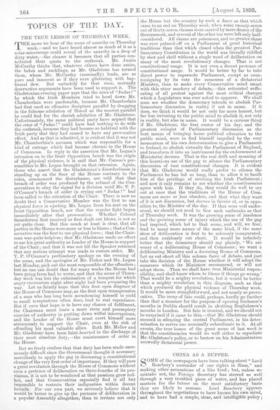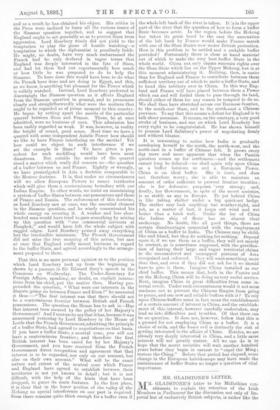CHINA AS A BUFFER.
Q OME of the newspapers have been talking about " Lord Rosebery's surrender of our rights in Siam," and making other accusations of a like kind ; but, unless we mistake not, the Foreign Secretary has steered us well through a very troubled piece of water, and has placed matters for the future on the most satisfactory basis they are likely to assume. Lord Rosebery appears throughout the negotiations to have known his own mind, and to have had a simple, clear, and intelligible policy ; and as a result he has obtained his object. His critics in the Press were inclined to lump all the various issues of the Siamese question together, and to suggest that England ought to act generally so as to protect Siam from aggression. Lord Rosebery wisely did not yield to the temptation to play the game of hostile watching—a temptation to which the diplomatist is peculiarly liable. He might, no doubt, have very much embarrassed the French had be only declared in vague terms that England was deeply interested in the fate of Siam, and had let them find out experimentally how much or how little he was prepared to do to help the Siamese. To have done this would have been to do what the French have done and are doing in Egypt, and this, as we know, is anything but pleasant for the Power which is sulkily watched. Instead, Lord Rosebery preferred to disentangle the Siamese question as it affects England from the Siamese question in general, and to pronounce clearly and straightforwardly what were the matters that ought to be regarded as of prime moment to this country. He began by setting apart the merits of the particular quarrel between Siam and France. Those, he at once admitted, were no business of ours. This admission has been rashly regarded as weak. It was, however, in reality the height of sound, good sense. Next time we have a quarrel with some independent Asiatic Power how should we like to have France interfering on the merits? Yet how could we object to such interference if we set the example in Siam ? To have given a pre- cedent for such meddling would have been most disastrous. But outside the merits of the quarrel stood a matter which really did concern us—the question of a bullet between us and France. Rightly or wrongly, we have promulgated in Asia a doctrine comparable to the Monroe doctrine. It is, that under no circumstances will we allow European Powers to annex territories which will give them a conterminous boundary with our Indian Empire. In other words, we insist on maintaining a system of buffer States between our possessions and those of France and Russia. The enforcement of this doctrine, as Lord Rosebery saw at once, was the essential element in the Siamese question, and he wisely concentrated his whole energy on securing it. A weaker and less clear- headed man would have tried to gain something by mixing up this question with " our commercial interests at Bangkok," and would have left the whole subject with ragged edges. Lord Rosebery pruned away everything but the irreducible minimum. The French Government did not miss the true meaning of this action, but saw at once that England really meant business in regard to the buffer State, and agreed accordingly to the arrange- ment proposed to them.
That this is no mere personal opinion as to the position which Lord Rosebery took up from the beginning is shown by a passage in Sir Edward Grey's speech in the Commons on Wednesday. The Under-Secretary for Foreign Affairs, speaking, no doubt, on explicit instruc- tions from his chief, put the matter thus. Having pro- pounded the question, " What were our interests in the dispute going on between France and Siam ?" he answered it thus :—" The first interest was that thera should not be a conterminous frontier between British and French possessions. The question the House has to ask is—Has that interest, been secured by the policy of her Majesty's G overnment? And I venture to say that it has, because it was announced yesterday by Lord Rosebery in the House of Lords that the French Govern ment,adniitting the principle of a buffer State, had agreed to negotiations on that basis. If you have a buffer State, a neutral zone, you will not have a conterminous frontier ; and therefore the first British interest has been cared for by her Majesty's Government, and you have received from the French Government direct recognition and agreement that that interest is to be regarded, not only on our account, but also on their own account." What will be the exact nature and extent of the neutral zone which France and England have agreed to establish between their territories is not yet known in detail ; but it is not difficult, with the help of the hints that have been dropped, to guess its main features. In the first place, it is clear that in the lower portion of the valley of the Mekong no special interference on our part is required. Siam there remains quite thick enough for a buffer even if the whole left bank of the river is taken. It is in the upper part of the river that the question of how to form a buffer State becomes acute. In the region before the Mekong has taken its great bend to the east the annexation of the left bank by France would make France march with one of the Shan States now under British protection. How is this problem to be settled and a suitable buffer provided ? Fortunately there is close at hand material out of which to make the very best buffer State in the whole world. China not only claims suzerain rights over the Shan State which lies on the Upper Mekong, but is at this moment administering it. Nothing, then, is easier than for England and France to contribute between them sufficient territory out of which to make a buffer State, and to hand this territory over to China. In this way Eng- land and France will have placed between them a Power which can and will forbid them to pass through its land, should either of them for any reason be tempted to do so. We shall thus have stretched across our Burmese frontier, to the south-east Siam, and to the north-east a Chinese province. To say that this means a defeat for England is to talk sheer nonsense. It means, on the contrary, a very good stroke of business, and one on which Lord Rosebery has every right to be congratulated. He has shown himself to possess Lord Salisbury's power of negotiating firmly and without bluster.
It is interesting to notice how India is gradually enveloping .herself to the north, the north-west, and the north-east in a buffer of Chinese felt. It grows every day more and more apparent that when the Pamirs question comes up for settlement—and the settlement cannot long be delayed—we shall again rely upon China as a buffer between us and a European Power.
China is an ideal buffer. She is inert, and does not therefore worry ; she is able to maintain an amount of order sufficient to prevent frontier troubles ; she is for defensive purposes 'very strong ; and, finally, her Government, in spite of the secret societies, is as stable as any in Europe. To get behind China is like taking shelter under a. big quick-set hedge. The shelter may look anything but weather-tight, and yet, as a matter of fact, it keeps out wind and wet better than a brick wall. Under the lee of China the Indian ship of State has an almost ideal anchorage. No doubt, like all good things, there are certain disadvantages connected with the employment of China as a buffer to India. The Chinese may be child- like and bland, but they do nothing for nothing. Depend upon it, if we use them as a buffer, they will not merely be content, as is sometimes supposed, with the gratifica- tion of having their large and vague territorial claims to the unconsidered and unmapped portions of Asia recognised and enforced. They will want something more than that, and even if they did not ask for it we should have to give it them. Imagine China installed as our chief buffer. This means that, both in the Pamirs and on the Mekong, China will be doing us very useful service. Next, imagine China in great difficulties from some in- ternal revolt. Under such circumstances would it not seem madness not to prevent the Chinese Empire from going to pieces, and our new and reliable buffers with it ? To rely upon Chinese buffers must in fact mean the establishment of a certain amount of interest in China, and the establish- ment of this interest, however carefully undertaken, may lead us into difficulties and troubles. Of that there can be no question. It does not, however, follow that this is a ground for not employing China as a buffer. It is a choice of evils, and the lesser evil is distinctly the risk of getting interested in the affairs of China. Besides, we are already very deeply interested in China, and a little more interest will not greatly matter. All we can do is to hope that the secret societies will wait another hundred years before they begin in earnest to " expel the Ming; restore the Ching." Before that period has elapsed, some change in the European kaleidoscope may have made the maintenance of buffer States no longer a question of vital importance.



































 Previous page
Previous page